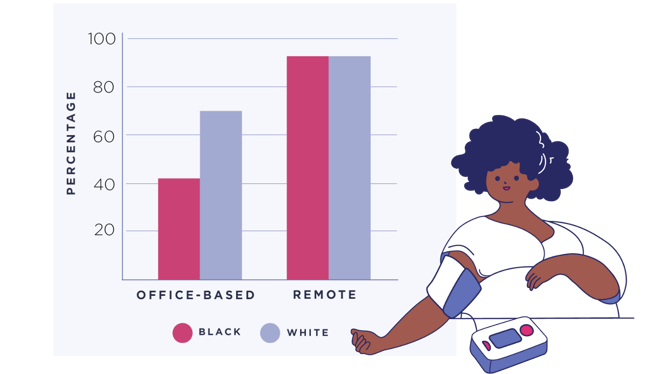Results of an randomized control trial* published this month show that remote monitoring through Babyscripts improved blood pressure collection for patients with postpartum hypertension, compared to monitoring in-person at a doctor's appointment.
Remote monitoring also eliminated racial disparities observed in office BP collection between White and Black patients.
Key results:
- One hundred ninety-seven patients were randomized (96 remote, 101 in-office). Patients with remote monitoring had higher rates of postpartum blood pressure ascertainment (91.7%) compared with in-office surveillance (58.4%)
- When stratifying the primary outcome by race and randomization group, Black patients had lower rates of blood pressure ascertainment than White patients when assigned to in-office surveillance (41.2% vs 69.5%), but there was no difference in the remote management group (92.9% vs 92.9%).

*The RCT, “Remote Monitoring Compared With In-Office Surveillance of Blood Pressure in Patients With Pregnancy-Related Hypertension,” was co-authored by Dr. Lauren Demosthenes, prior to assuming her role as Senior Medical Director at Babyscripts, and was funded by a grant through the South Carolina Telehealth Alliance.
WHY IT MATTERS
According to one study, Black women are more than twice as likely to have uncontrolled blood pressure than White women. Additionally, Black women are more likely to have obesity than White women - a contributor to hypertension and cardiovascular issues. These disparities persisted even after controlling for social determinants of health, medical conditions and lifestyle.
Hypertension during pregnancy is one of the leading causes of maternal mortality, accounting for about 8% of pregnancy-related deaths. And that number doesn't account for the long term effects on heart health that result from hypertension. Many of these complications don't manifest until after childbirth, leading to ACOG's recommendation that women have a BP check-in at 7-10 days postpartum.
Because Black women are less likely to return to pre-pregnancy BP level, it is even more crucial that they have close BP monitoring during pregnancy and postpartum as well as a long-term cardiovascular follow-up.
Unfortunately, about 70% of women fail to attend that postpartum follow-up appointment. They're managing their new reality of motherhood, maybe they're responsible for other children at home, maybe they lack a support system -- there are myriad reasons why a new mother might struggle to attend that appointment.
That 70% disproportionately represents Black women. According to one study, Black patients were less likely to attend a postpartum visit than non-Black patients, with 63.9 percent of Black patients attending these visits compared with 88.7 percent of their non-Black peers. Those numbers worsened during the pandemic.
Remote MONITORING PROMOTES HEALTH EQUITY
With remote monitoring, Babyscripts offers a convenient way for providers to collect blood pressure data from their patients without relying on them to attend their appointments. This is particularly significant for the Black population, who have historically higher rates of postpartum complications but lower rates of postpartum visit attendance.
With health equity representing one of the biggest challenges to improving maternal health in the US, the results of the RCT are a validation of the beneficial role that Babyscripts and remote monitoring can play in addressing our maternal health crisis.

Submit a comment